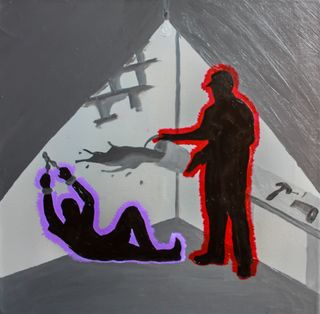
I think all of us at one time or another have been fascinated by psychopaths, either from movies and books, or from biographical accounts of the many sadistic personages from history. We still find it hard to reconcile that the actions of some psychopathic killers were also the actions of a sane person, making the psychopath seem like a walking contradiction. This inability to grasp the motivations of the psychopathic has in the past led to many defendants being sent to a mental institution for treatment, rather than to prison or Death Row.
Trying to make sense of the actions of a psychopath is fraught with difficulty. The irony is that we apply our empathy to understand an individual who consistently fails to understand and feel different points of view. Inevitably, our empathy fails to recreate anything, and we are left with nothing more than the cliched person suit before us. This subjective black hole leaves the psychopath to some extent undefinable, and like black holes will continue to suck us in as we philosophize over the nature of emptiness. It is this very quality that makes the psychopath a commodity for authors, and a delight for readers.
I am often wary of the admiration some have for the psychopathic, and have sometimes pondered the reasons behind such admiration. I’m the first to admit that I’m academically beguiled by psychopathy. The fact that mental health experts can use any validated psychopathy diagnostic tool to go on and find structural differences in the brains of psychopaths is mind-blowing. However, I am also the first to admit how abhorred and repulsed I am when it comes to the behavior of psychopaths, especially when reading the testimony of victims. This push-pull of intrigue and repulsion commands that a good deal of human thought time is dedicated to the conundrum of psychopathy. And to add another layer, it is not uncommon to see a history of abuse towards a child who later grows up to become a despicable monster – leaving us wanting to save the child, but condemn the adult.
I think psychopaths also represent a freedom to act. There are times when many of us become angry or frustrated with ourselves because we somehow failed to act during a defining or critical moment in our lives. The reason for inaction doesn’t really matter, if we are left feeling frustrated; this is made worse if it has been a continuation of precedent, where we have failed to speak up for most of our lives, and this most recent time was yet another reminder. Psychopaths are not bound by a conscience or a superego, and so they usually have the motivation to act when they feel appropriate. Psychopaths are seen to get the job done, even if it (probably) means getting your hands dirty. This is a defining characteristic of many folklore and literary heroes.
In a weird way, I also think psychopaths are admired because they have a strong potential to do nasty things to other people. This isn’t to say that we all want to do nasty things to other people and we admire them for that, but being assured in ourselves that we could if we needed to, in a perverse way might reinforce our confidence; this feeds back into the satisfying idea that we could get our hands dirty if needed, within the right moral confines, of course.
We must remind ourselves, though, that it’s dangerous to preserve the psychopathic as a symbol, as a last ditch savior of the human race who can act without emotion. Acting without emotion is not by default a stronger or wiser position, in fact sometimes it’s quite the contrary.
This shows us another reason that people tend to admire the pathologically emotionless. Everyone has been hurt from a relationship, and during those times we have felt weak or humiliated, or just wished to become numb. However, it’s worth bearing in mind that emotions also make the world a very colorful and amazing place to live. Part of growing up is learning to take the rough with the smooth, and we must realize that without emotion life would be extremely dull. It is for this reason that I genuinely pity the psychopath because their disorder has robbed them of the richness and diversity of human experience.
Humans will always allow psychopaths to live on the border between reality and imagination, and it is for this reason they will remain an ever-alluring shadow to the human spirit. But every once in a while, we should remind ourselves of the extreme poverty of the psychopath experience.


